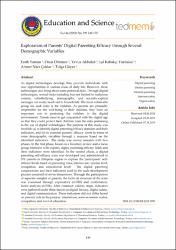Exploration of Parents' Digital Parenting Efficacy through Several Demographic Variables

View/
Access
info:eu-repo/semantics/openAccessDate
2019Author
Yaman, FatihDönmez, Onur
Akbulut, Yavuz
Kabakçı Yurdakul, Işıl
Çoklar, Ahmet Naci
Guyer, Tolga
Metadata
Show full item recordAbstract
As digital technologies develop, they provide individuals with new opportunities in various areas of daily life. However, these technologies also bring about some potential risks. Through digital technologies, several risks including but not limited to malicious content, cyberbullying, pornography, and sexually-explicit messages can easily reach out to households. The most vulnerable group for such risks is the children. As parents are primarily responsible for the well-being of their children, they have an important role in protecting the children in the digital environment. Parents need to get acquainted with the digital age so that they could protect their children from the risks pertaining to the use of digital technologies. The purpose of this study was twofold: (a) to identify digital parenting efficacy domains and their indicators, and (b) to examine parents' efficacy levels in terms of some demographic variables through a measure based on the identified indicators. The study was survey research with two phases. In the first phase, based on a literature review and a focus group interview with experts, digital parenting efficacy fields and their indicators were identified. In the second phase, a digital parenting self-efficacy scale was developed and administered to 576 parents in Eskisehir region to explore the participants' self-efficacy levels based on parenting roles, internet use, income level, occupation, and educational level. The digital parenting competencies and their indicators used in the scale development process consisted of seven dimensions. Through the participation of separate samples of parents, the factorial structure of the scale was examined through exploratory (n=520) and confirmatory factor analyses (n=556). After construct validity steps, indicators were gathered under three factors as digital literacy, digital safety, and digital communication. These indicators did not differ based on parents' role in the process, internet use, socio-economic status, occupation, and level of education.
Source
Eğitim ve Bilim-Education and ScienceVolume
44Issue
199Collections
- Makale Koleksiyonu [217]
- WoS İndeksli Yayınlar Koleksiyonu [7605]
Related items
Showing items related by title, author, creator and subject.
-
Preschool Children's Views Regarding Their Parents' Frequency of Internet Use at Home and Its Relevant Effects
Erişti, Bahadır; Avcı, Fatma (Turkish Green Crescent Soc, 2018)This research aims to describe the intensity of parents' Internet use at home and its relevant effects on their children based on their preschool children's views. This study, a qualitative research, has a phenomenological ... -
Ortaöğretim okullarında öğrenci görüşlerine göre aile katılımı: bir ölçek uyarlaması
Ahioğlu Lindberg, E. Nihal; Demircan, Ayşe Nur (Anadolu Üniversitesi, 2013)Bu çalışmanın amacı Epstein, Connors ve Salinas (1993) tarafından geliştirilen ―Ortaöğretim Okullarında Aile Katılımı: Öğrenci Ölçeği‖nin Türkçe’ye uyarlanmasıdır. Çalışmanın araştırma grubunu, Kastamonu İl merkezindeki ... -
The effectiveness of a parent education programme offered through distance education about Independent Autistic Children Education Centre (IACEC)
Yücel, G.; Cavkaytar, Atilla (2007)The purpose of this study was to determine the effectiveness of a parent education program on parents' awareness about the Independent Autistic Children Education Centre (ACEC: in Turkish OCEM). The program was offered ...

















